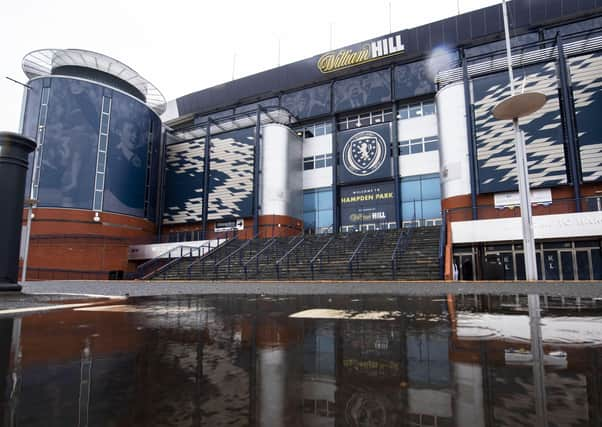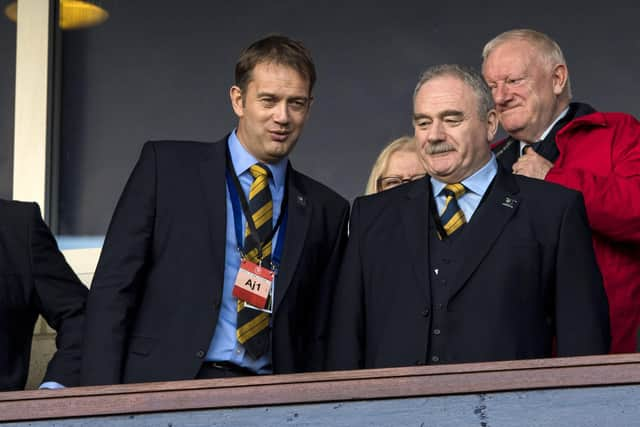Coronavirus: Who is in football’s Joint Response Group and what do they do?


It is Scottish football’s equivalent of the Cobra meetings chaired by Boris Johnson in Westminster or the Scottish Government’s Resilience Committee overseen by Nicola Sturgeon.
As the country’s national sport tries to navigate its own particular path through the coronavirus pandemic, the recently constituted Joint Response Group is fast becoming part of the lexicon for Scottish football followers.
Advertisement
Hide AdAdvertisement
Hide AdFormed in an attempt to deliver a unified response from the Scottish FA and the Scottish Professional Football League to the impact of the global health crisis, the Joint Response Group convenes on a daily basis, either in person at Hampden or by conference call.


It’s arguably the most onerous and momentous responsibility ever to be placed upon anyone charged with the administration of the game in Scotland.
As it stands, there are four permanent members of the Joint Response Group – Scottish FA president Rod Petrie, Scottish FA chief executive Ian Maxwell, SPFL chief executive Neil Doncaster and Dr John MacLean, the Scottish FA’s chief medical consultant.
In addition, the input and contributions of others from both governing bodies, clubs and other stakeholders in the sport will be called upon as and when required.
As Scottish football grapples with the financial and sporting implications of Covid-19 over the coming weeks and months, The Scotsman profiles the four men on the front line of the battle...
Ian Maxwell
With over 500 senior appearances to his credit as a respected defender for Queen’s Park, Ross County, St Johnstone, St Mirren and Partick Thistle, Maxwell has rapidly achieved a far higher profile as an administrator than he ever did as a player. When he became chief executive of the Scottish FA in May 2018, replacing Stewart Regan, who had resigned three months earlier, he was landed with a daunting in-tray which included deciding the future of Hampden as the National Stadium and the report into football’s child abuse scandal in Scotland.
Maxwell is now the public voice of the Scottish FA’s response to coronavirus and has already expressed major reservations over Uefa’s hopes that the Euro 2020 play-off at Hampden could go ahead in June.
The 44-year-old, who worked in the construction industry during the phase of his playing career when he was part-time, made his first move from dressing-room to boardroom when he was appointed general manager of Partick Thistle in 2011.
Advertisement
Hide AdAdvertisement
Hide AdHe became managing director of the Firhill club three years later and served on the board of both the SPFL and Scottish FA. Maxwell is currently also a vice-chairman of Uefa’s Youth and Amateur Football Committee.
Rod Petrie
Seldom, if ever, has the expertise of the hugely respected MacLean been more needed and valued by Scottish football.
A vice-chairman of Uefa’s Medical Committee, MacLean has been a doctor to the Scottish FA’s national teams at various age group levels since 1983. Having also worked as doctor for Clyde when Craig Brown was their manager, he has been with the senior Scotland squad since the Euro 96 finals in England.
Since 2002, MacLean has been at the helm of the National Stadium Sports, Health and Injury Clinic at Hampden, regarded as one of the finest facilities of its kind anywhere in Europe.
The 61 year old and his staff at the clinic recently played a leading role in the research study looking into the possible causes of dementia among footballers.
MacLean has also worked with PFA Scotland to help players with mental health issues and last year received the organisation’s Special Merit Award.
During the current crisis, MacLean provides a crucial contribution as he assesses the guidance and information provided by the UK’s Chief Medical Officers and the World Health Organisation and helps the Joint Response Group determine how Scottish football should react to it.
Dr John MacLean
Seldom, if ever, has the expertise of the hugely respected MacLean been more needed and valued by Scottish football.
Advertisement
Hide AdAdvertisement
Hide AdA vice-chairman of Uefa’s Medical Committee, MacLean has been a doctor to the Scottish FA’s national teams at various age group levels since 1983. Having also worked as doctor for Clyde when Craig Brown was their manager, he has been with the senior Scotland squad since the Euro 96 finals in England.
Since 2002, MacLean has been at the helm of the National Stadium Sports, Health and Injury Clinic at Hampden, regarded as one of the finest facilities of its kind anywhere in Europe.
The 61 year old and his staff at the clinic recently played a leading role in the research study looking into the possible causes of dementia among footballers.
MacLean has also worked with PFA Scotland to help players with mental health issues and last year received the organisation’s Special Merit Award.
During the current crisis, MacLean provides a crucial contribution as he assesses the guidance and information provided by the UK’s Chief Medical Officers and the World Health Organisation and helps the Joint Response Group determine how Scottish football should react to it.
Neil Doncaster
A former solicitor, Doncaster has now spent more than two decades at the sharp end of football administration. He joined Norwich City as secretary in 1997, becoming chief executive of the Carrow Road club four years later. During his time with Norwich, Doncaster served as a board member of both the English Football League and the Football Association. He was appointed chief executive of the Scottish Premier League in 2009 and has proved to be an unshakably phlegmatic character, valued by the member clubs he serves as a human shield in times of crisis.
When the SPL subsumed the Scottish Football League to form the SPFL in the summer of 2013, Doncaster was retained as the chief executive of the new organisation. The 49-year-old must deal with one of the thorniest issues created by the coronavirus pandemic, how the SPFL determine title winners along with promoted and relegated clubs if the 2019-20 season cannot be completed. Doncaster has also been a full board member of the Scottish FA since 2018 and also serves on Uefa’s Legal Committee.
Comments
Want to join the conversation? Please or to comment on this article.